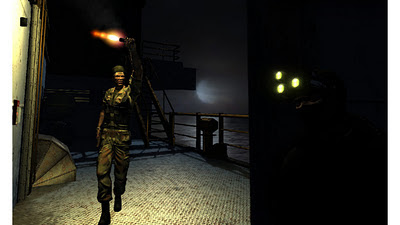
Featured Blog | This community-written post highlights the best of what the game industry has to offer. Read more like it on the Game Developer Blogs.
Splinter Cell's Morality
In an age of transparent features - witness Silent Hill: Shattered Memories' boiler plate "This game plays you!" psych warning - Splinter Cell: Chaos Theory is miraculous. You see, Chaos Theory has a morality system, but it's not obvious about it.

Featured on Critical Distance Oct. 2011.
In an age of transparent features - witness Silent Hill: Shattered Memories' boiler plate "This game plays you!" psychology warning - Splinter Cell: Chaos Theory is miraculous. You see, Chaos Theory has a morality system, but it's not obvious about it in the way that Mass Effect or inFamous are. It is in the game's design itself, not painted in menu choices and groovy colors.
|
Movement that puts you in character is moral movement. |
But first, let me talk about how the player moves. In this area, from animation to control, the game does the amazing feat of placing you in the black wet soles of a government spook like never before. Sam Fisher actually moves with the confident predatory feel of Batman in 2009's Arkham Asylum; no longer do his weapons seem plastic, or his aim barely competent to artificially increase player difficulty.
This freedom of movement not only creates an easier game from a superficial level, but also serves to impart the player with a certain freedom of choice in how one approaches levels. Released in 2005, Chaos Theory is one of those titles that has staying power in a niche of players, and even now I've seen posts on various messages boards about how players approach the game: most, interestingly enough, almost always choose to play a "no contact" run
In other words, they intentionally perform non-violently, sometimes avoiding the enemy entirely (not even knocking them out.) This was much riskier, and harder to do, in the original Splinter Cell, especially if you only had a console version at hand, which stripped the game of the ability to save anywhere for harsh, barely existent check points.
|
Avoidance, not confrontation. |
It's this newly found freedom of movement that plays a key role in allowing the player to take the morality system into his own hands. No longer do players just do what is most convenient but they are actually allowed to take the most peaceful path.
Of course, I didn't find myself always doing this. Some people did die, usually with a knife to the gut or neck, or a sharply placed shot between the eyes. It depends on if they merely inconvenienced me or actually roused my ire.
For a good 90% of the game, I followed along with the rest of the players, going for knock outs, creating distractions with lights and grenades, or just avoiding guards entirely. The game is actually constructed to lend you sympathy for most of them: they're not evil, they're just grunts and sometimes in the wrong place.
Dialogue you can overhear puts this clearly in the player's mind: one guard in the opening lighthouse mission stood in a rain storm overlooking a stormy sea, telling his partner about how his family was killed in a strike by American soldiers during a thunder storm, and how weather like they were in terrifies him to this day. Other little touches, like having several guards carry on about how one is paranoid and the other not cautious enough when they reacted to me shooting out a light, or the terrified expressions on your enemies faces when you seize them vs. Fisher's usually masked presence, only further their humanity.
Another fascinating aspect is the interrogation feature. In this, the player must sneak up behind an enemy, grab them by the neck, and tap a button to threaten them. This engages you in a chat with the enemy, usually with a snappy back-and-forth style. By making the conversations so enjoyable to listen to, and sometimes rewarding the player by having information about weapons supplies be revealed through them, Chaos Theory subtly pushes you towards 1) performing more interrogations 2) which results in you having to keep enemies alive until you speak to them instead of simply plugging them 3) encourages players to keep the enemy alive, period, because they form a connection to them. Even if it is just due to a guard dropping a funny line about Sam being a ninja, it helps further human connection.
|
About to interrogate--or incapacitate? |
But wait, what about those rare times I did go for a kill? Well, a few just happened as simple accidents--in a realistic manner, they stumbled upon me and I reacted without thinking. The others? I found myself sparing people who just happened to be in the wrong place, or just wanted to do their job, or wanted out, but I reserved a special animosity for people like the torturers in the lighthouse chapter, one of whom was very delighted to do their job. Interestingly, these torturers often rank high on those that players doing no contact runs decided to break their own rules for--I think Clint Hocking and his team pricked a nerve with that.
In sum, the morality system of Splinter Cell: Chaos Theory is all about freedom. The game does not outline set choices, but rather lets you the player form your morality from the game's "suggestions" like the enemy dialogue, e-mails, and the manner in which enemies are placed (they don't just stand or march, some of them go off on walks to enjoy the view, sleep, take drinks, write e-mails, pace.) Really, it's stunning how much humanity is on display in little cues and how important the dialogue is to what would most obviously be called an action game.
Without jerking you by the arm, the game's design coaxes you towards playing in a "moral" manner and avoids the usual Tom Clancy jingoism for a brighter conclusion. If we consider the game's concept of information warfare, this is actually perfect: so much weighs on conversation in Sam's world, as in ours.
Want more legitimate game criticism? Enter Strange Country.
Read more about:
Featured BlogsAbout the Author(s)
You May Also Like












